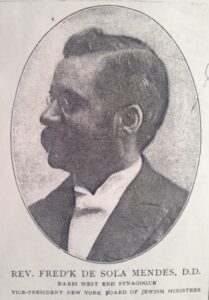Born on July 8, 1850, in Montego Bay, Jamaica, Frederick de Sola Mendes was a part of the Mendes family of Spanish and Portuguese rabbis, including his father Rabbi Abraham Pereira Mendes. His mother was Eliza de Sola, coming from thirteen generations of rabbis in Italy, France, and Amsterdam, including Frederick’s grandfather Rabbi David Aaron de Sola, and great-grandfather Haham Raphael Meldola.

Frederick was educated at Northwick College, University College School, and the University of London. He then studied rabbinics at the Jewish Theological Seminary of Breslau, Germany. He obtained his Ph.D. in 1871 from Jena University. He received semikhah (rabbinic license) in London in 1873. He served at the Great St. Helen’s Synagogue in London, and then in 1874 moved to New York to work at Temple Shaaray Tefila (now known as the West End Synagogue), which named him rabbi in 1877, and he served until retirement. He led the congregation to “modern Orthodoxy” and ultimately to the Reform movement, adding an organ, women into the choir, and egalitarian worship.
His career included a wide reputation for his writings and scholarship. In 1879 he and a group including his brother Henry founded American Hebrew Magazine. In 1888, involved in the Field-Ingersoll controversy (Christianity versus agnosticism), he wrote an article “In Defense of Jehovah,” published in the North American Review, which increased his renown.
Rabbi Mendes served beginning in 1900 as a revising editor and chief of the translation bureau for the Jewish Encyclopaedia (a resource your correspondent greatly appreciates), and in 1903 became editor of the monthly Menorah. He served as a reviewer for the version of the Bible put forth by the Jewish Publication Society of America. He also served as an officer in the New York Board of Jewish Ministers.
He was the author of Child’s First Bible, Outlines of Bible History, and Defense Not Defiance. (His brother Henry meanwhile served over 50 years as leader of New York’s Congregation Shearith Israel, the “Spanish and Portuguese Synagogue,” at which an earlier family member had served as cantor from 1748-1757. Founded in 1654 by Jews from Dutch Brazil, it is reportedly the oldest congregation in the United States.)
On November 10, 1920, The New York Times reported on a luncheon given on the occasion of his retirement two weeks prior. At the time he was one of the oldest rabbis in the city and 30 members of the clergy gathered at the Café Boulevard to honor him.